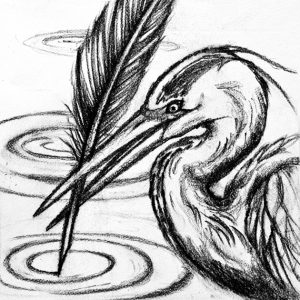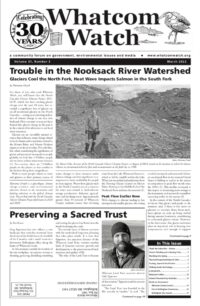“When power leads man toward arrogance, poetry reminds him of his limitations. When power narrows the area of man’s concern, poetry reminds him of the richness and diversity of existence. When power corrupts, poetry cleanses.” — John F. Kennedy
Boris Schleinkofer, poetrywatch editor
Do You Enjoy poetrywatch?
Want to see it continue? Then please, send your poems to us and let the Whatcom Watch share them with our readership! Seriously, we really do want your roughly 25-line poems though length is by no means a deal-breaker; it’s how you use those lines. Featuring or specific to Whatcom County and issues addressed by Whatcom Watch such as government, the environment and media. Send your poems to: poetry@whatcomwatch.org and let’s make magic happen.
Subject matter is unlimited, but poetry featuring or specific to What- com County and issues addressed by Whatcom Watch (government, the environment and media) will likely get first preference.
Please keep it to around 25 lines; otherwise, we might have to edit your work to fit. Don’t make yourself unprintable.
Send poems and your short, two- or three-sentence bios as a word document attachment to poetry@whatcomwatch.org.
The deadline is the first day of the month.
Please understand that acceptance and final appearance of pieces are subject to space constraints and editorial requirements. By submitting, authors give Whatcom Watch permission for one-time publication rights in the paper and electronic editions.
The hum
by Tim Pilgrim
Secret must be at the heart
of it — knowing something others
will learn someday, likely not soon.
And maybe happiness has a part —
or contentment at least. We
bear witness to joy any secret keeper
exudes. We hear not a whisper
of the secret. Not even a song.
Glean only hint, an audible clue.
Glaciers hum, Antarctica hums.
Wind whips across the ice shelf,
makes ice move a bit, disturbing
snow. We hear the resulting hum.
On a Colorado peak, we see mist
shroud steep mountain peaks,
fog belly along streams, crawl
into valleys, obscure tamarack, fir,
spring, stream. We feel wind scud
across scree, past boulders,
over cairns. If we do not breathe,
let ear guide us, the hum is clear.
Scientists have found all the Earth
is humming — in F major. The secret
nature hums about quite likely explains
how to keep the planet from dying.
We do sing, about ourselves. So far,
our grade in humming — F minus.
(previously published by Harbinger Asylum)
_______________________
Timothy Pilgrim, emeritus associate professor of journalism at Western Washington University, is the author of “Seduced by metaphor: Timothy Pilgrim collected published poems” (Cairn Shadow Press, 2021). His work can be found at timothypilgrim.org.
Just One of Those Days
by Margaret Wild
Daylight Savings starts. Up early. Adjust four clocks. Hop in
the car. Adjust car clock. Drive Bellingham to La Conner.
Arrive before art exhibit opens for a good parking space nearby.
Stretch my legs. Pop into a shop first. Actually buy a colorful
top after a pandemic year of no clothes shopping. In fact, this
trip is first time out of town after more than twenty months …
twenty months! Even the annual art exhibit was cancelled last
year. Well, this year the exhibit is excellent, engaging, a treat.
Twelve invitational artists on the main floor. The work of forty
more artists on the second floor where you can vote for your
favorite, the people’s choice, so I did. The sun is out now. Hop
in the car again. Up the hill to the renowned quilt museum
showing all new amazing works from around the world, all so
unique and intriguing. It takes another hour to absorb. Back
to the car. Now it’s drizzling outside. Eat my picnic lunch in
the car parked next to Swinomish Channel. Watch the birds
and boats, their shapes distorted when viewed through the
wet window. Moving on. Quick stop for coffee. Then head
north, around the round-a-bout, past the polo grounds I love
so much, where George Dill raises horses and hosts a yearly
event. On to the Farm-to-Market Road. A detour leads me back
to Bayside Road, but that’s ok because it’s scenic too. The sun
comes out again, the wind picks up … here in the wide open
space of Skagit Valley. It is impossible not to stop and join two
women with their mega camera equipment, photographing
owls, hawks, kestrels as the birds cruise about. Continuing
on again, winding this way and that, over the slough, past the
huge eagle’s nest, I stop once more to check out two small and
well-known galleries in the tiny town of Bow/Edison. There’s
an exhibit of just trees portrayed by several artists. What a
coincidence as I just finished reading the novel “Greenwood,”
by Michael Christie in which trees are a central theme in the
lives of one family over several generations. The story captivated
me as much as the art on the wall. Now midafternoon, it’s still
sunny but the sky begins to dim. It’s time for the final stretch
home, leaving the splendor of the valley behind. The highway
is somewhat busy but traffic is moving smoothly, not rushed
as it can be sometimes. The car carries me along, up the hill,
past the long stretch of tall and thick evergreen trees, past the
painted boulder, past the waterfall, past the lake. It is still light
outside when I arrive home, safe and sound and happy as can
be. Oh what a beautiful day.
_________________________
Margaret Wild has been a lifelong fan of nature, and is known as an advocate for healthcare reform. The Pacific Northwest has been home for most of her life.





























